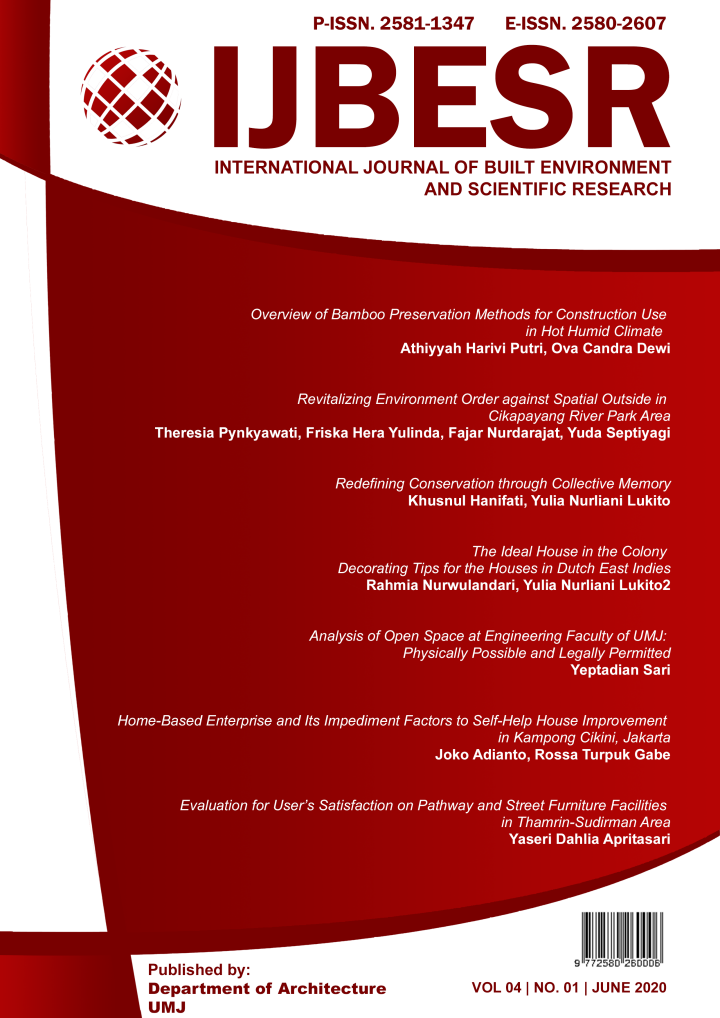Home-Based Enterprise and Its Impediment Factors to Self-Help House Improvement in Kampong Cikini, Jakarta
DOI:
https://doi.org/10.24853/ijbesr.4.1.49-60Keywords:
kampong, self-help, house, improvement, home-based enterprise, tenure security.Abstract
This research aims to embellish the existing literature on Home-Based Enterprise (HBE) to recuperate it as one of the effective solutions for self-help slum improvement programs in the future. Many experts have praised HBE as one of the plausible solutions for slum alleviation through income-generating activities that will enable the underprivileged to perform self-help house improvement. However, there is a vague establishment between HBE to self-help house improvement in Kampong Cikini, as one of the notable slum settlements in Central Jakarta. Through the employment of the case study method, this research established HBE’s contribution to self-help house improvement is less significant because of several impediments, which indicates the increment monthly income from HBE cannot automatically ignite the self-help house improvement. Both HBE and self-help house improvement are inseparable from socio-economy activities in the neighborhood and cannot be comprehended as an individual economy household’s activities. Therefore, specific solutions are required to overcome the mainly encountered impediments with considering the established interwoven domestic and economic activities, for increasing the impact of HBE to self-help house improvement.References
Arifin, L. (2001). The Contribution of Kampung to the Sustainable Livelihood of Surabaya City Case Study Kampung Nelayan Kenjeran as Tourism District, presented at the international conference of “Sustainable Livelihood Informal Settlements in Asia, Latin America and Africa, 10 October 2001.
Chen, M. (2004). Informality at work: Re-conceptualizing the employment challenge. International Convention Centre, Durban, South Africa 21st – 22nd October, 2004.
Coen, S.E., Ross, N.A., & Turner, S. (2008). Without tiendas it’s a dead neighborhood: The socio-economic importance of small trade stores in Cochabamba, Bolivia, Cities, 25, 327-339.
Daryono. (2010). Transformation of Land Rights in Indonesia: A Mixed Private and Public Law Model. Pacific Rim Law & Policy Journal, 19(3), 417-457.
Davis, M. (2006). Planet of Slums, London: Verso.
de Soto, H. (2000). The mystery of capital: why capitalism triumphs in the West and fails everywhere else. London: Bantam Press.
Felstead, A., Jewson, N., & Walters, S. (2005). Changing Places of Work, Basingstoke: Palgrave Macmillan.
Gordon, R., Hudson, J., Nell, M., & Mkhabela I. (2006). Literature Review on entrepreneurship: Housing and Housing Finance. Resource Report 3, Nairobi: Shisaka Development Services (Pty) Ltd.
Gough, K.V. (2010). Continuity and Adaptability of Home-Based Enterprises-Longitudinal Study from Accra, Ghana. International Development Planning Review, 32(11), 45-70.
Harsono, B. (2008). The Indonesian Agrarian Law: Historical Formation of the Land Act, Content and Implementation. Jakarta: Djambatan.
Ibrahim, B. (2002). The Role of Home Based Enterprises (HBEs) in Alleviating Sudanese Urban Poverty and the Effectiveness of Policies and Programmes to Promote HBEs, Sudan Economy Research Group, Discussion Paper no 34, University of Bremen, Bremen.
Kellett, P., & Tipple, G. (2000). The home as workplace: a study of income generating activities within a domestic setting. Environment and Urbanization, 12(1), 203-213.
Lawanson, T. (2012). Poverty, Home Based Enterprises and Urban Livelihoods in the Lagos Metropolis, Journal of Sustainable Development in Africa,14 (4), 158-171.
Lawanson, T., & Olanrewaju, D. (2012). The Home as Workplace: Investigating Home Based Enterprises in Low-Income Settlements of the Lagos Metropolis, Proceedings of 48th ISOCARP Congress.
Marsoyo, A. (2012). Constructing Spatial Capital: Household Adaptation Strategies in Home-Based Enterprises in Yogyakarta, Unpublished dissertation, Newcastle: University of Newcastle upon Tyne.
Muraya, P. W. K. (2006). Urban planning and small-scale enterprises in Nairobi, Kenya, Habitat International, 30,127–143.
Payne, G., Durand-Lasserve, A., & Rakodi, C. (2007). Social and Economic Impacts of Land Titling Programmes in Urban and Peri-urban Areas: A Review of the Literature', in World Bank Urban Research Symposium, Washington DC, 14-16 May, 2007.
Rahman, M.M. (2004). Housing affordability: Ability or Willingness? Symposium on Housing II- Affordable Dwelling, March 27-30, High Commission for the Development of Arriyadh, KSA.
Raj, M., & Nientied, P. (1990). Housing and Income in Third World Urban Development. London: Aspect Publishing.
Roy, A. (2005). Urban Informality: Toward an Epistemology. Journal of the American Planning Association, 71(2), 147-158.
Tipple, G. A. (2005a). The place of home-based enterprises in the informal sector: Evidence from Cochabamba, New Delhi, Surabaya and Pretoria. Urban Studies, 42(4), 611–632.
Tipple, G. A. (2005b). Pollution and Waste Production in Home-Based Enterprises in Developing Countries: Perceptions and Realities, Journal of Environmental Planning and Management, 48(2), 275–298.
Tipple, G. A., & Ameen, A.S. (1999). User initiated extension activity in Bangladesh: “building slums” or area improvement? Environment and Urbanization, 11(1), 367-376.
Turner, J. F. C. (1972). Freedom to Build, London: The Macmillan Company.
Tutuko, P., Shen, Z. (2013). Vernacular Pattern of House Development for Home-based Enterprises in Malang, Indonesia, International review for spatial planning and sustainable development, 2 (3), 63-77.
Van Gelder, J. (2010). What tenure security? The case for a tripartite view. Land Use Policy, 27, 449–456.







